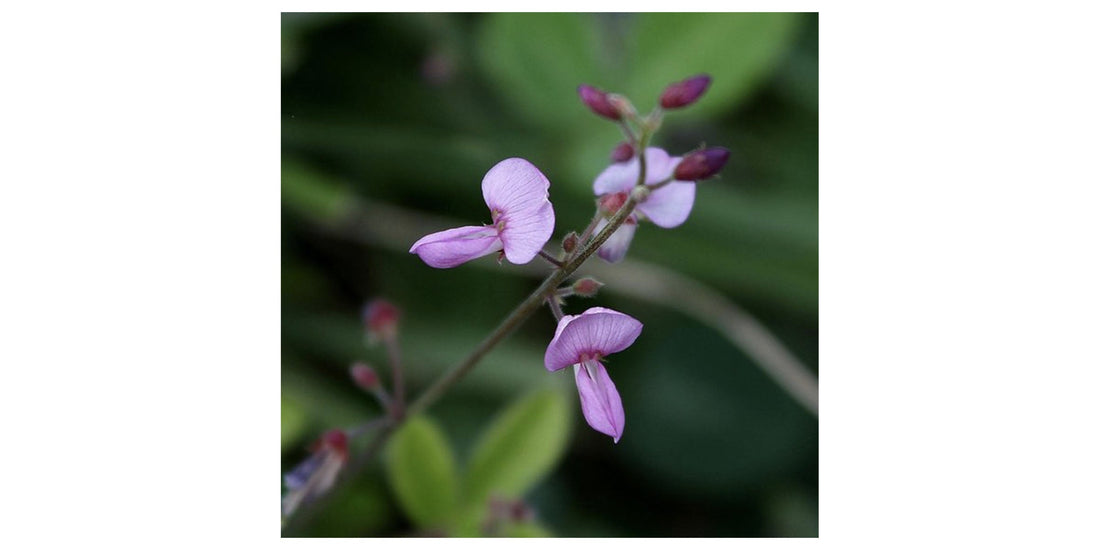A little known plant with a long history of benefits
Desmodium Ascendons is not your common household plant. This wonderous rainforest herb has been used for centuries in Chinese medicine and by native peoples in Africa and South America. Ayurvedic medicine has also consistently used this miraculous plant in their treatments.
Desmodium (for short) has been used to treat a variety of conditions including jaundice, hepatitis, rheumatism, asthma, and bronchitis (it has bronchial dilating properties), allergic reactions, skin issues, and various inflammatory conditions.
What does Western medicine say?
Phytochemical screening of desmodium leaf extract shows the presence of alkaloids, flavonoids, saponins, tannins, glycosides, and polyphenol. (2)
Flavonoids, which are of high concentration in desmodium, have been shown to inhibit coagulation, thrombus formation or platelet aggregation, and reduce the risk of atherosclerosis. They can also help to reduce arterial blood pressure and the risk of hypertension, reduce oxidative stress, improve capillary function, and regulate carbohydrate and glucose metabolism. (2) High levels of flavonoids inhibit the pro-inflammatory activities of enzymes in free radical production.
Desmodium also has a high concentration of polyphenols which are powerful antioxidants. Antioxidants may help protect the body’s cells from harmful free radicals. Free radicals can increase LDL cholesterol, which can in turn increase the risk for heart disease.
Polyphenols and flavonoids jointly may have a lowering effect on plasma creatinine and urea concentration, thereby protecting the kidneys.
Alkaloids present in relatively high concentrations in desmodium are nitrogen-containing natural compounds that have a wide range of potential pharmacological benefits.
These include the treatment of hepatitis, jaundice, malaria, eczema, asthma, and even cancer. They are also cholinomimetic, vasodilatory, antiarrhythmic, analgesic, antibacterial, and antihyperglycemic. (1, 2)
Studies have shown that the saponins found in desmodium promote normal cholesterol and support overall wellness. In the digestive tract, saponins help to emulsify fat-soluble molecules. They bind to bile acids and help eliminate them from the body, thereby preventing cholesterol from being reabsorbed. Saponins could be described as a “scrubber” of various toxins from the body. (2)
The extraction process really matters
At PhytoQuant, we have sourced the finest quality plants in Cameroon, Africa. There, we oversee the growing, harvesting, and transportation process of our plants. We then conduct rigorous testing when the harvest is received in Italy. (1)
Even more critical to our quality is the extraction process. Studies have shown that alcohol extraction may actually cause a breakdown of the beneficial elements of the plant, and introduce toxicity at higher doses. (3) Our activated water extraction process does not produce toxic effects and actually helps to retain the beneficial qualities of the plant. We, therefore, produce a product of greater efficacy without the toxic side effects of other methods. (2)
PhytoQuant has worked to ensure that QuantaSmodium+ contains the highest concentration of Desmodium Ascendons on the market today, and it’s also cost-effective.
We believe that QuantaSmodium+ is a critical addition to every practitioner's arsenal.
We’re glad that you’re here, and we intend to continue to share what we know to be true. We are here to help. Contact us if you are interested in connecting with a practitioner in the PhytoQuant Community. Please feel free to reach out to us if we can help.
info@steinerlabs.org
540-592-3365
Mon-Thurs/ 10 am ET – 4 pm ET
In case you missed it, check out Part I, Part II, Part III and Part IV in our series on Gut Health and Immunity.
Are you a Health Professional interested in learning more about our products and how we can work together? Please contact us at holli@steinerlabs.org
(1) * Dossier published by PhytoQuant, Monaco - Please contact us for a copy
(2) https://biomedgrid.com/pdf/AJBSR.MS.ID.000598.pdf
(3) https://www.ncbi.nlm.nih.gov/pmc/articles/PMC4566765/
These products are not intended to diagnose, treat, cure, or prevent any disease.

